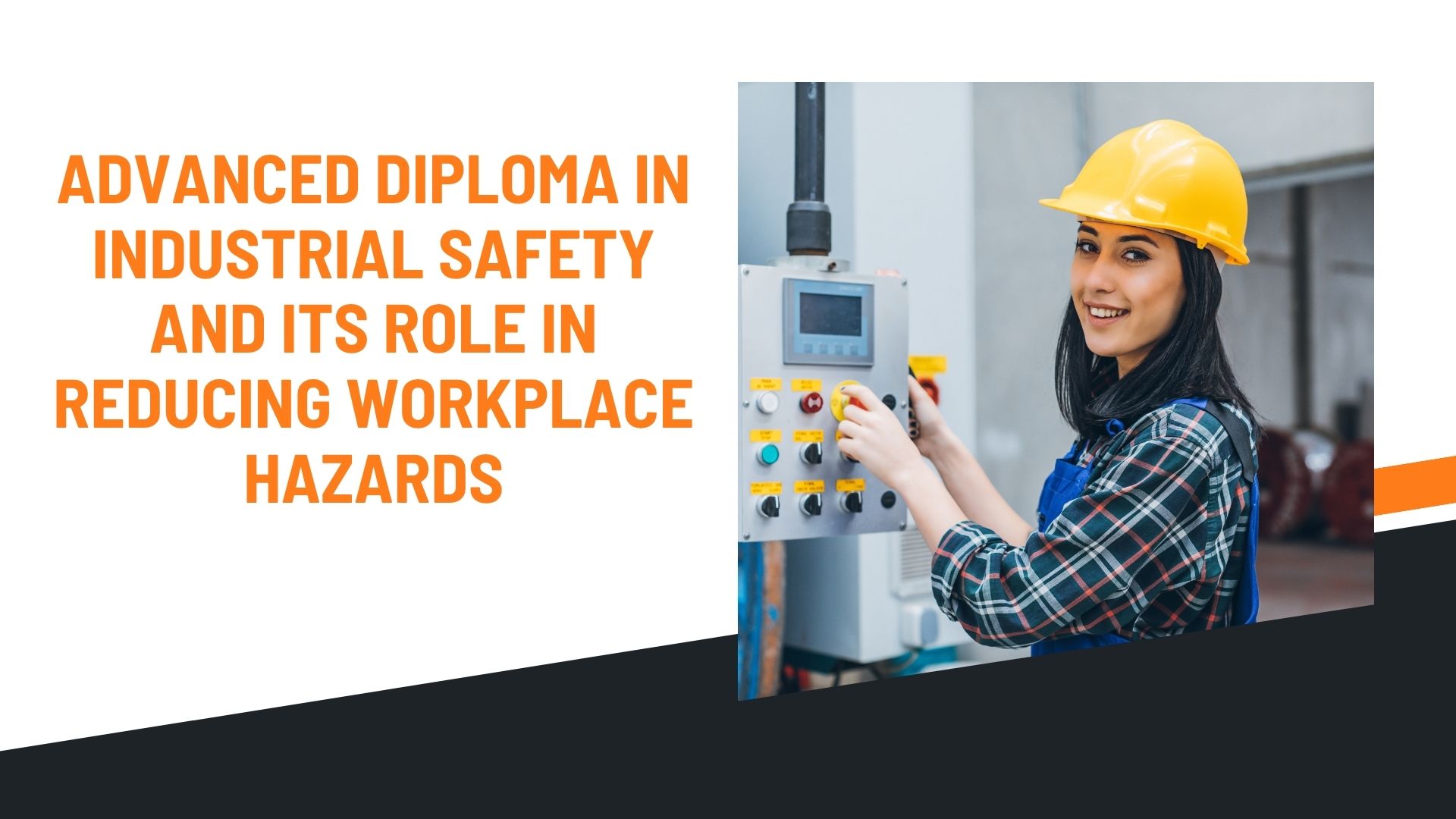Advanced Diploma in Industrial Safety and Its Role in Reducing Workplace Hazards

Introduction
Workplace safety is one of the most critical aspects of modern industries. From manufacturing plants to construction sites and chemical factories, organizations face multiple risks that can result in accidents, injuries, or even fatalities. In this context, professionals trained in safety management play a vital role in creating safer work environments. One qualification that stands out in preparing individuals for this responsibility is the Advanced Diploma in Industrial Safety (ADIS).
This diploma is specifically designed to provide in-depth knowledge about industrial hazards, risk assessment, and preventive measures to ensure compliance with national and international safety standards. Beyond theoretical learning, it equips students with practical skills to identify hazards, implement safety protocols, and develop safety-first workplace cultures.
In this article, we will explore what the Advanced Diploma in Industrial Safety entails and how it significantly contributes to reducing workplace hazards.
What is an Advanced Diploma in Industrial Safety?
The Advanced Diploma in Industrial Safety is a specialized professional qualification aimed at developing expertise in industrial safety, fire safety, and occupational health. The course covers a wide range of topics including:
- Industrial Hazard Management
- Fire Safety and Fire Protection Systems
- Occupational Health and Hygiene
- Environmental Safety and Sustainability
- Accident Investigation and Analysis
- Legal Compliance and Safety Standards
The duration of the program typically ranges from 1 year to 18 months, depending on the institution and mode of learning (regular or distance education). The curriculum focuses on both theory and practical applications, preparing candidates to work across multiple sectors such as oil and gas, construction, manufacturing, and chemical industries.
Why is Workplace Safety So Important?
Before understanding the role of ADIS, it’s important to highlight why workplace safety is critical:
- Prevention of Accidents and Injuries: Unsafe work environments can lead to serious injuries and even loss of life.
- Legal and Regulatory Compliance: Governments have strict safety laws and non-compliance can lead to heavy penalties or shutdowns.
- Financial Savings: Fewer accidents mean lower compensation costs, insurance premiums, and downtime losses.
- Employee Morale and Productivity: A safe workplace boosts confidence, morale, and overall productivity.
These reasons underline the demand for professionals who are well-trained in safety protocols—and that’s where ADIS plays a crucial role.
The Role of Advanced Diploma in Industrial Safety in Reducing Workplace Hazards
1. Identification of Hazards
The first step in ensuring workplace safety is identifying potential hazards. ADIS graduates are trained to:
- Conduct risk assessments
- Recognize chemical, mechanical, and environmental hazards
- Use safety audits and checklists
By identifying hazards early, organizations can take preventive action before accidents occur.
2. Risk Assessment and Control Measures
After hazard identification, the next step is risk evaluation. Through ADIS training, professionals learn how to:
- Evaluate severity and likelihood of risks
- Prioritize risks using frameworks like Hazard and Operability (HAZOP) studies
- Recommend appropriate control measures
For example, in a chemical plant, a trained safety officer can suggest installing leak detection systems or improving ventilation to reduce the risk of toxic exposure.
3. Fire and Explosion Prevention
Industries such as oil and gas, manufacturing, and textiles have high fire hazards. ADIS covers:
- Fire detection and suppression systems
- Emergency evacuation plans
- Storage and handling of flammable substances
By implementing these measures, trained professionals reduce the chances of catastrophic fires and explosions.
4. Ensuring Legal Compliance
Different countries have stringent safety regulations. ADIS graduates are knowledgeable about:
- Factories Act
- Occupational Safety and Health Administration (OSHA) standards
- Environmental Protection Laws
This ensures organizations comply with legal requirements, avoiding penalties and reputational damage.
5. Promoting Safety Culture
One of the most effective ways to prevent workplace accidents is to create a safety-first culture. ADIS professionals act as:
- Trainers for employees on safe practices
- Auditors who check safety compliance
- Advisors to management on safety investments
When employees understand the importance of safety, they are more likely to follow protocols and reduce risky behavior.
6. Emergency Preparedness and Disaster Management
Industrial accidents like gas leaks or machinery failures can occur unexpectedly. ADIS-trained professionals develop:
- Emergency response plans
- Disaster management strategies
- Mock drills to ensure readiness
Preparedness reduces the impact of accidents and ensures quick recovery.
Benefits of Pursuing an Advanced Diploma in Industrial Safety
- High Demand for Safety Officers: Almost every industry requires trained safety professionals.
- Global Career Opportunities: The qualification aligns with international safety standards, making it valuable for jobs abroad.
- Competitive Salaries: Due to high demand and specialized skills, salaries are attractive.
- Contribution to Society: Safety professionals save lives and prevent injuries, making their role socially significant.
Career Opportunities After ADIS
- Safety Officer / Engineer
- HSE (Health, Safety & Environment) Manager
- Fire Safety Officer
- Risk Assessment Consultant
- Compliance Auditor
Industries hiring ADIS professionals include oil & gas, construction, power plants, pharmaceuticals, manufacturing, and mining.
Note: For career growth visit best Institute of Fire Engineering and Safety Management
Conclusion
The Advanced Diploma in Industrial Safety is more than just a certification; it is a pathway to creating safer workplaces and reducing industrial hazards. With comprehensive training in risk assessment, fire safety, and legal compliance, ADIS professionals play a crucial role in protecting lives and assets. As industries expand and safety standards become stricter, the demand for qualified safety experts will continue to grow—making this diploma an excellent career investment.




